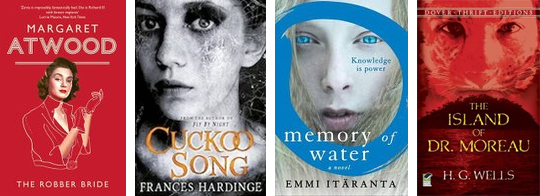re:View – The 2016 Bookshelf: June
June was all about moving flats, so my contact with books was mostly limited to packing them in boxes, carrying them and buying new book storage. Managed to squeeze in a few reading hours though. You could say this edition of Bookshelf is all about monsters – human, superhuman and in between.

The Robber Bride by Margaret Atwood
This was my first book by Atwood outside the realms of sci-fi / dystopia and I struggled a bit initially when I realised this was all going to be about relationships – but Atwood’s brilliant style soon won me over. In many ways this is a long and mostly sad story of three women who didn’t have a lucky start in life and put themselves on an even unluckier path by choosing the wrong kind of men. Initially we are led to believe it’s all the fault of the mysterious Zenia – the Robber Bride, the Jezebel, morally decayed to the bone, seemingly born without a conscience, without any sense of female camaraderie – who lies and cheats her way through the lives of these three, bent on stealing their men and ruining their happiness. But as the story of each woman unfolds you can’t help but wonder if Zenia didn’t indeed do them a favour by relieving them of cheating husbands that were only preying on their gullible nature, helplessness or financial security. I still can’t decide whether I found this book uplifting or depressing. True, the women all come out of the encounter with Zenia stronger, if not necessarily happier, but all the female characters are either infuriatingly gullible and spineless, or else the embodiment of all female evil. It’s a bit like a war of different types of femininity in which nobody wins. However, Atwood’s writing style and world view is delightful and irresistible as always, so I still loved this book overall.
Pens: 4 out of 5
Cuckoo Song by Frances Hardinge
Triss wakes up from an illness one day and realises that she’s not quite herself anymore – dolls come to life in her presence, she’s inhumanly hungry, and that’s just the start. As Triss tries to figure out what’s wrong with her, she uncovers a world of mystery and danger that goes far beyond her own family’s tragedy. Hardinge has created a darkly fascinating children’s story, with strong overtones of The Girl With All the Gifts and Neil Gaiman’s Neverwhere, that draws you deep into a strange world where what you see isn’t quite what’s really there.
Pens: 3 out of 5
Memory of Water by Emmi Itäranta
A beautiful dystopian novel that felt very much like Margaret Atwood for young adults. In an unspecified future time, parts of the world have been rendered uninhabitable by war and ecological destruction and for the remaining post-apocalyptic colonies resources are scarce. Water rationing is administered brutally, so when tea master-in-training Noria learns about a secret water source, she is thrust into a position of great responsibility – and great danger. Absolutely everything about this book is wonderful: both the characters and their broken world are vibrant and full of life, yet just as fragile as the ancient tea ceremonies around which much of the story revolves. A perfect introduction to dystopian fiction for young readers, and a gripping read for speculative fiction lovers of all ages.
Pens: 4 out of 5
The Island of Dr. Moreau by H. G. Wells
This has been on my long list of classics forever, but when I got round to reading it I found it quite disappointing. Sure, it’s a classic and has inspired a raft of movies (if not an entire genre), and shows incredible foresight in raising ethical issues surrounding what is basically an early form of genetic engineering. But as a product of its era it’s just full of that Victorian, male, white supremacist kind of thinking that’s incredibly irritating to read these days. All that makes it another one of those books that I’m glad I read but didn’t necessarily enjoy much.
Pens: 2 out of 5
